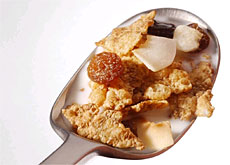Muesli celebrates a century of good health

It is 100 years since Swiss doctor Maximilian Bircher-Benner opened a sanatorium in Zurich serving up a special dish of fruit, milk and nuts to treat a variety of ailments.
Muesli is a lasting symbol of an alternative and holistic health movement that started around the end of the 19th century, and is being rediscovered.
Muesli was based on Bircher-Benner’s health diet of raw vegetables and fruit. The original recipe called for a mix of oats soaked in water, lemon juice, condensed milk, grated apples and nuts.
It proved so popular that muesli – sometimes spelt musli – is the only Swiss-German word to have found its way into every major language, even though the muesli served at breakfast tables the world over bears little resemblance to the original concoction.
Bircher-Benner believed that cooking killed the “sun’s energy” contained in vegetables, and did not think there was much nutritional value in meat, the main dietary staple of city dwellers at the time.
Living Force
Patients at Bircher-Benner’s Living Force clinic were prescribed the special diet, in addition to plenty of exercise and fresh air.
The doctor had no scientific evidence to back his theory, which eventually led to a break with the Zurich medical association, which lasted for decades.
His approach worked though, and patients suffering from various ailments soon started flocking to the clinic in the hills above Zurich.
But Bircher-Benner was not the only holistic healer at the time in the western world.
Naomi Rogers, a professor of the history of medicine at Yale University, says his clinic’s popularity was part of a backlash against industrialised society.
Critique of modern medicine
“It was a deliberate critique of modern medicine at the time, and also modern eating,” Rogers told swissinfo at a Bircher-Benner symposium in Zurich held to mark the anniversary.
“They wanted to know why people were so sickly and needed so many drugs and why doctors did so well prescribing them.
“Bircher-Benner certainly comes out of that movement,” she added.
“There was a concern that healthy eating should be beyond class, so the poor could afford it too.
“The argument was that if you looked in the woods or in the mountains, you saw that people who were eating very little were eating very nutritiously. However, I think there was a lot of romanticism involved.”
Writer’s block
The clinic flourished and continued to do so long after Bircher-Benner died in 1939.
More than 40,000 patients passed through its doors between 1904 and 1994, when it closed for economic reasons.
Among them were Golda Meir, Yehudi Menuhin and the German author, Thomas Mann, who described the clinic as a “hygienic prison” that nonetheless was able to rid him of his stubborn constipation.
Hundreds of former patients and staff members turned out for the anniversary event at the former clinic, now a development and reception centre for Zurich Financial Services.
Close to nature
“You can call it vegetarianism. It starts in your mind and goes through your stomach,” said a former patient, Dan Rubenstein, who suffered from a rare inflammatory disease of the joints.
“The philosophy is to be as close as possible to nature.”
The head of the Bircher-Benner archives, Eberhard Wolff, told swissinfo that there is ample evidence in the records that the pioneering doctor and his successors treated the whole person and not just the symptoms.
“Bircher-Benner often asked them to write a diary, so we have wonderful material in the archives of the patients describing their feelings,” Wolff said.
In homage to Bircher-Benner, muesli made according to the original recipe is on the breakfast menu of the Zurich Financial Services restaurant.
Rogers says she could not resist having a bowl for breakfast, sitting in the restaurant among businessmen connected with the financial institution.
“It was very interesting to see men in suits eating muesli!”
swissinfo, Dale Bechtel in Zurich
Original muesli recipe:
Take a tablespoon of oats and soak in three tablespoons of cold water for 12 hours.
Add a tablespoon of lemon juice, sweetened condensed milk and 200 grams of grated apple. Top with a tablespoon of grated hazelnut.
Maximilian Bircher-Benner (1867-1939) founded his first alternative health clinic in 1897 with six beds.
The clinic proved so popular that in 1904 he moved to larger premises with 60 beds on the Zurichberg, a hill overlooking the city.
Bircher-Benner promoted the body’s self-healing properties, and a diet of fruit and raw vegetables was a key part of his therapy.
He believed raw vegetables contained the “sun’s energy” and therefore was ahead of his time in vitamin research.
Zurich’s Mühlerama museum will hold a special exhibition dedicated to muesli from the end of April.

In compliance with the JTI standards
More: SWI swissinfo.ch certified by the Journalism Trust Initiative


You can find an overview of ongoing debates with our journalists here. Please join us!
If you want to start a conversation about a topic raised in this article or want to report factual errors, email us at english@swissinfo.ch.